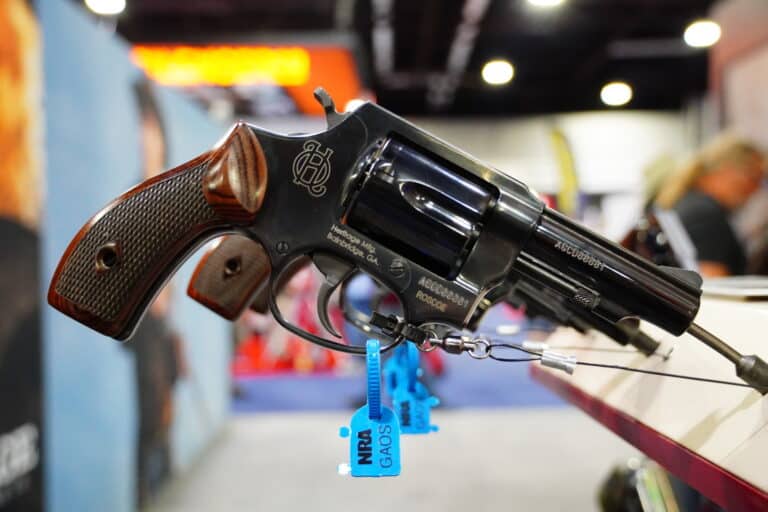After years of being on the defensive, gun-rights advocates have successfully turned back the bulk of corporate gun-control policies.
This week saw them notch their most prominent victory to date. Citigroup on Tuesday announced it was ending its policy of severely limiting its business relationships with the firearms industry. The bank previously restricted its services to businesses that sell bump stocks, “high-capacity” magazines, or firearms to adults under the age of 21.
“We will no longer have a specific policy as it relates to firearms,” Ed Skyler, Citigroup’s Executive Vice President of Enterprise Services and Public Affairs, wrote in a post explaining the policy change.
That announcement came on the heels of a similar about-face from Bank of America, which recently rolled back its policy of refusing to do business with companies that manufacture or sell what it considers “military-style firearms.” As a result, two of the three largest banks in the country, in short succession, have now announced their intention to resume normal relations with lawful firearm businesses after a seven-year hiatus.
It’s an abrupt shift that can largely be explained by gun-rights activists learning to take a page from their political opponents’ playbooks when it comes to corporate pressure.
Following the 2018 shooting at Marjory Stoneman Douglas High School, gun-control advocates had tremendous success in bending numerous corporations to their will through public pressure campaigns designed to anathematize the gun industry. Those included banks like Citi and Bank of America, as well as major retailers like Dick’s Sporting Goods and Walmart, which each agreed to stop selling certain semi-automatic firearms or any firearms at all to adults under the age of 21.
The gun-control group Everytown counts more than two dozen major national companies that announced significant policy changes designed to crack down on the presence of firearms or the facilitation of gun commerce in 2018 alone, all in response to the Parkland shooting and subsequent outcry from activists. It was a display of solidarity between the interests of corporate America and a slice of progressive political activists and marked a high point for the gun-control movement’s cultural power, at least in recent years.
That push was met with pushback, however. Spurred by these corporate announcements and numerous instances of gun businesses losing access to banking services for unexplained reasons, gun-rights groups began formulating ways to put their own pressure on financial companies. They did this primarily through legislation cracking down on what they deemed financial “discrimination” against the gun industry.
The resulting policy, first adopted in Texas in 2021, generally prohibits state funds from being invested with financial institutions that discriminate against legal firearms companies. For instance, Texas Attorney General Ken Paxton (R.) invoked the law when he denied Citi the ability to underwrite a $3.4 billion bond deal in the state over its lending stance toward gun businesses. Florida and nine other Republican-controlled states have passed versions of this firearms industry anti-discrimination legislation.
That quickly paid dividends for gun-rights advocates. Bank of America officials specifically cited concerns over the new anti-discrimination laws in Texas and Florida in its decision to walk back its blanket ban on lending to manufacturers of semi-automatic rifles, for example. But now, an even bigger factor giving gun-rights advocates the upper hand in the pressure contest has been the re-election of Donald Trump as President.
Almost immediately after retaking office, Trump used his bully pulpit to pressure America’s financial giants into backing off liberal policies. During a virtual appearance at the World Economic Forum in January, he publicly accused Bank of America CEO Brian Moynihan and JP Morgan Chase CEO Jamie Dimon of “debanking” conservatives.
“The Bank of America, they don’t take conservative business,” he said. “You, Jamie [Dimon], and everybody, I hope you’re going to open your banks to conservatives because what you’re doing is wrong.”
Citigroup evidently heard the President’s message and cited the prospect of him coming after them when explaining their policy flip-flop.
“We appreciate the concerns that are being raised regarding ‘fair access’ to banking services, and we are following regulatory developments, recent Executive Orders and federal legislation that impact this area,” Citi’s Skyler wrote. “In light of those developments, we took an objective look at our policies and practices with the intent of striking the right balance between our commitment to fair and unbiased access to our products while continuing to manage all risks to the bank appropriately.”
Whether additional companies will soon follow suit behind Citigroup and Bank of America in revising their post-Parkland stances remains to be seen. Although their reversals are significant wins for gun-rights advocates, they are just two of the dozens of companies that have chosen to take public stands against their interests. They still have a long way to go to match the pressure campaign success that their opponents have had in recent years.
Being able to count on the President as a megaphone in their push certainly bodes well for their chances, as he’s had swift success in prompting other forms of corporate policy rollbacks to date.
But that isn’t without risk. Just as some government allies, such as New York financial regulator Maria Vullo, pushed beyond constitutional bounds when pressuring companies to adopt policies gun-control activists wanted, the same could happen for gun-rights activists. President Trump has already been accused of pushing beyond those same bounds in numerous other areas, such as his fight with several Ivy League schools.
Additionally, policies discarded in the name of political expedience can just as easily be reinstated once the political winds shift again, and Trump will only be in office for another three and a half years. It’s far from guaranteed that the banks will remain committed to their appreciation for “fair access” to gun businesses under a future, less pugilistic chief executive.
Nevertheless, gun-rights advocates have pressed their agenda in corporate boardrooms to an extent that would have seemed unthinkable back in 2018.






